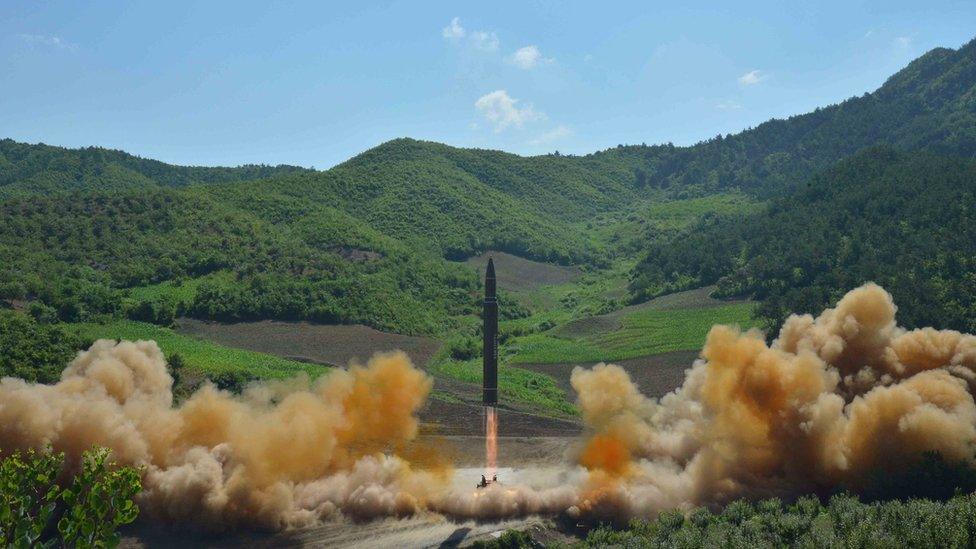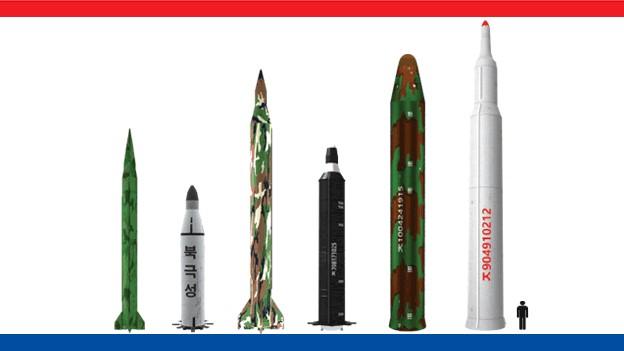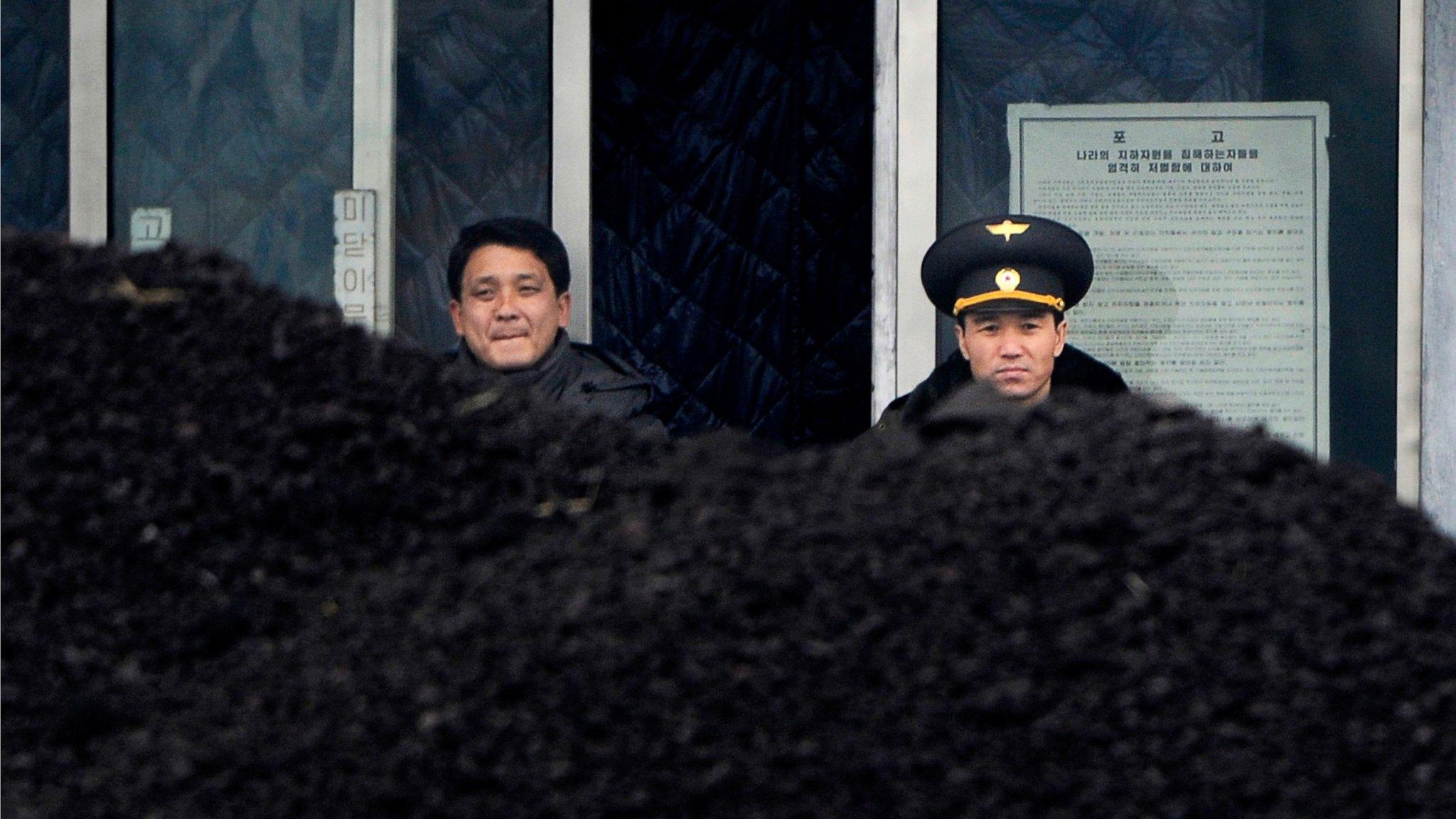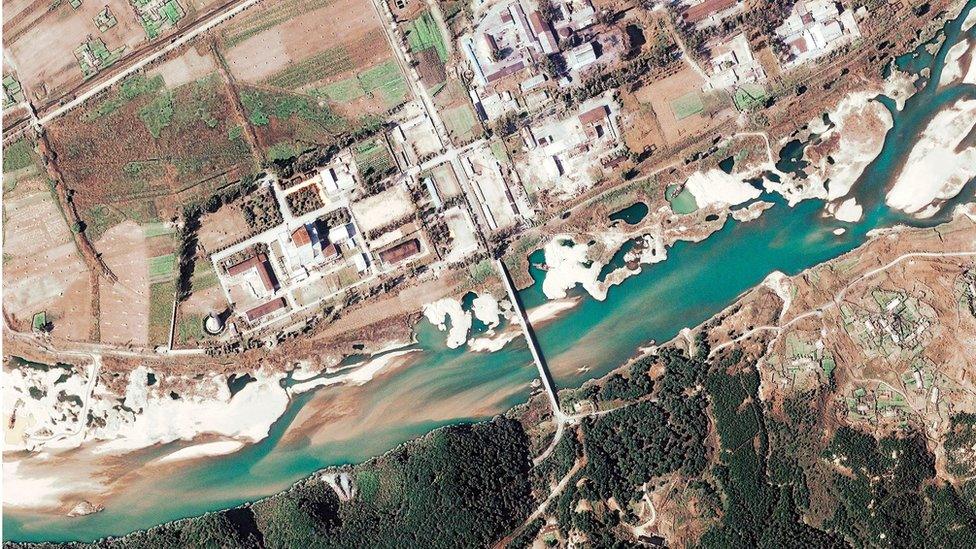North Korea ICBM launch: US and S Korea respond with drill
- Published
Missiles fired during US-South Korea drills serve as warning to North Korea
The US and South Korea have held a ballistic missile drill, after North Korea tested a long-range missile experts believe may reach Alaska.
Self-restraint was "all that separated armistice and war" and could be changed at any time, the two allies said.
It would be a "grave mistake" for the North to think otherwise, they said.
China and Russia have urged both sides to stop flexing their military muscle and said they opposed any attempts at regime change in North Korea.
Meanwhile US President Donald Trump questioned Beijing's commitment to countering North Korea's nuclear threat, apparently citing, external China's first-quarter trade figures.
"Trade between China and North Korea grew almost 40 pct in the first quarter. So much for China working with us - but we had to give it a try!" he tweeted, external.
The missile launch, the latest in a series of tests, was in defiance of a ban by the United Nations Security Council (UNSC).
The US has asked for an urgent meeting of the UNSC to discuss the issue. A closed-door session of the 15-member body will take place later on Wednesday.
Pyongyang claimed on Tuesday to have successfully tested an intercontinental ballistic missile (ICBM).
However, most experts believe that the North does not yet have long-range nuclear weapon capabilities.
The two Koreas are technically still at war as the 1950-1953 Korean War ended in an armistice.
How have the US and South Korea responded?
The allies conducted a ballistic missile fire exercise in the Sea of Japan.
South Korean President Moon Jae-in said the allies needed to demonstrate their missile defence posture "with action, not just a statement", his office said.
Meanwhile, a joint statement by Gen Vincent Brooks, commander of US forces Korea, and South Korean Joint Chiefs Chairman Gen Lee Sun-jin said the allies were maintaining patience and self-restraint, but this could change.
"We are able to change our choice when so ordered by our alliance's national leaders. It would be a grave mistake for anyone to believe anything to the contrary," it said.
Earlier, US Secretary of State Rex Tillerson called North Korea's move, external a "new escalation of the threat" and warned that Washington "will never accept a nuclear-armed North Korea".
Mr Tillerson said "global action is required to stop a global threat" and warned that any nation that provided economic or military benefits to the North, or failed to fully implement UN Security Council resolutions, was "aiding and abetting a dangerous regime".

What is an ICBM?

A long-range missile usually designed to carry a nuclear warhead
The minimum range is 5,500km (3,400 miles), although most fly about 10,000km or more
Pyongyang has previously displayed two types of ICBMs: the KN-08, with a range of 11,500km, and the KN-14, with a range of 10,000km, but before 4 July had not claimed to have flight tested an ICBM. It is not clear what differentiates the Hwasong-14

What has North Korea said?
State news agency KCNA quoted leader Kim Jong-un as saying the test was a "gift" to the Americans on their independence day.
The report warned of the possibility of more tests, saying he ordered officials to "frequently send big and small 'gift packages' to the Yankees".
"One expert says the missile could reach Alaska"
Pyongyang said earlier the Hwasong-14 intercontinental ballistic missile (ICBM) had reached an altitude of 2,802km (1,731 miles) and flew 933km for 39 minutes before hitting a target in the sea.
North Korea, it said, was now "a full-fledged nuclear power that has been possessed of the most powerful inter-continental ballistic rocket capable of hitting any part of the world".

Does North Korea really have a long-range weapon now?
Some experts believe that Tuesday's test proves that it has a missile that could travel across the globe and reach Alaska.
Physicist David Wright said it could reach a maximum range of about 6,700km, external on a standard trajectory, while South Korea's defence ministry on Wednesday put the range between 7,000 and 8,000km.
North Korean state TV announces "successful" missile test
But whether that missile could deliver a warhead is still a question.
Pyongyang claimed the rocket carried a "heavy warhead" and that it "accurately hit the targeted waters without any structural breakdown".
South Korea said there was no evidence proving the missile could withstand high temperatures and successfully re-enter the atmosphere, reported Yonhap news agency., external

Experts believe Pyongyang does not yet have the capability to miniaturise a nuclear warhead, fit it onto a long-range missile, and ensure it is protected until delivery to the target.
They say many of North Korea's missiles cannot accurately hit targets.
But others believe that, external at the rate it is going, Pyongyang may overcome these challenges and develop a nuclear weapon that could strike the US within five to 10 years.

What now for Washington? - Dr John Nilsson-Wright, Chatham House

North Korean media released this image of Tuesday's missile launch
By bringing Alaska within range, the new missile test is an unambiguous game-changer in both symbolical and practical terms.
US territory (albeit separate from the contiguous continental US) is now finally within Pyongyang's cross-hairs.
For the first time a US president has to accept that the North poses a "real and present" danger not merely to north-east Asia and America's key allies - but to the US proper.
President Trump's weakness lies in having overplayed his hand too publicly and too loudly.

How is the rest of the world reacting?
Japan on Tuesday said "repeated provocations like this are absolutely unacceptable" and lodged a protest.
Meanwhile China - who is Pyongyang's main economic ally - and Russia have called on North Korea to suspend its ballistic missile programme in exchange for a halt on the large-scale military exercises by the US and South Korea.
Chinese President Xi Jinping and Russian counterpart Vladimir Putin, who met in Moscow on Tuesday, said "the opposing sides should start negotiations".
On Wednesday, Russian Foreign Minister Sergey Lavrov added that the two countries opposed any attempts to resolve the crisis by force.
"The task of the denuclearisation of the entire Korean peninsula cannot and should not be used as a disguise for attempts to change North Korea's regime. This is our common position," he said.
- Published20 April 2017

- Published4 July 2017

- Published10 August 2017
- Published10 August 2017
